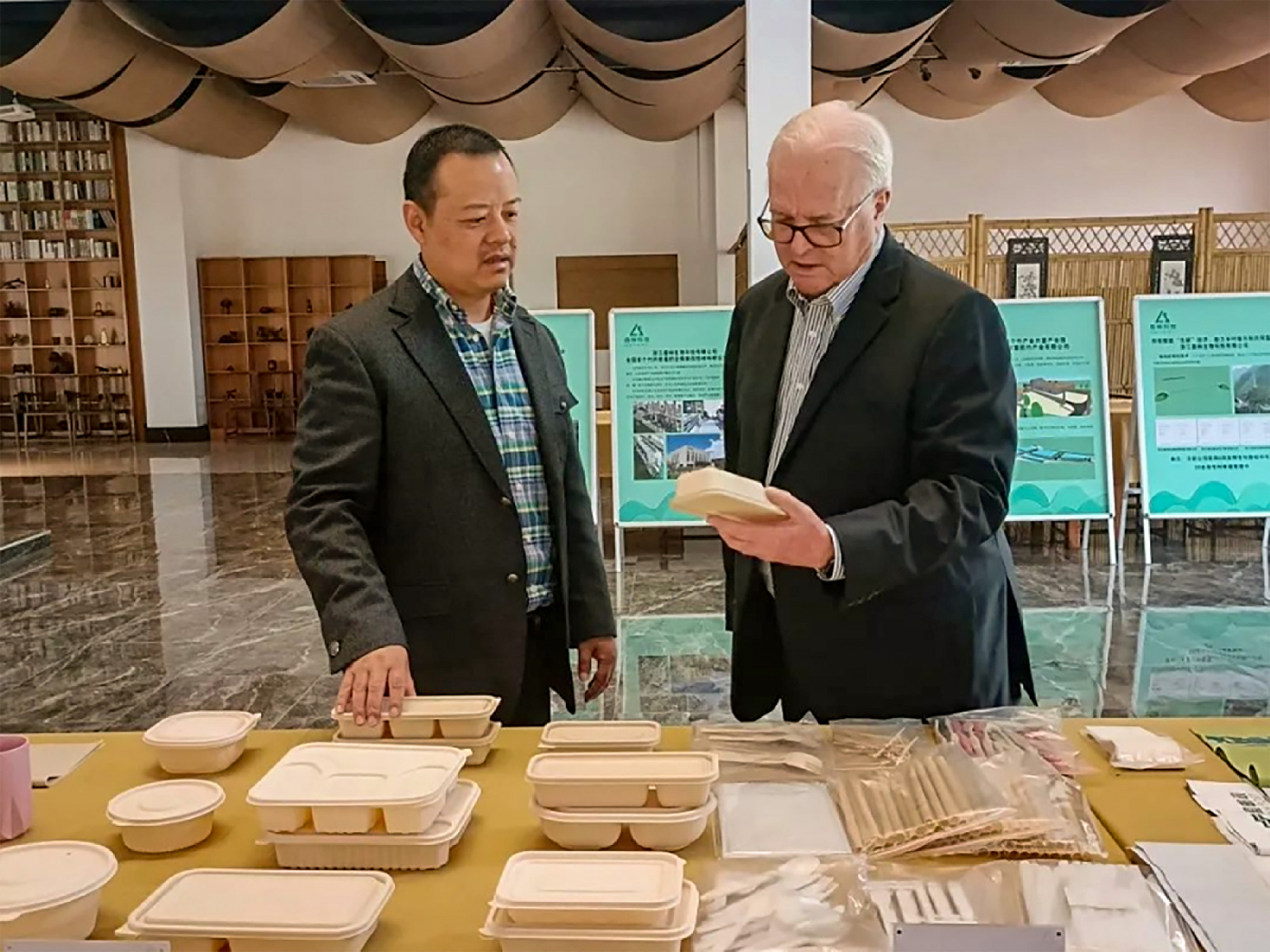With a given name that literally means “forest”, Ye Senlin is proud to be in the business of preserving nature.
Two years ago, he started a company called Senlin Biotechnology that specialises in turning the world’s fastest-growing plant into fully degradable bags, dinner boxes and straws.
Technically a type of grass, bamboo is the richest natural resource in Ye’s hometown of Anji, a county about a three-hour drive from Shanghai. And the plant replenishes itself so rapidly, compared with traditional wood sources, that some say it could be a viable alternative to plastic.
Do you have questions about the biggest topics and trends from around the world? Get the answers with SCMP Knowledge, our new platform of curated content with explainers, FAQs, analyses and infographics brought to you by our award-winning team.
“I’m very confident in the ‘replacing plastics with bamboo’ sector. It’s where the future lies,” Ye said.

Ye was referring to an initiative launched last year by authorities in Anji, which has blossomed into a tourist attraction featuring lush bamboo forests and clean mountain air – a far cry from the town’s industrial roots, with mines and cement factories punctuating the landscape for decades.
The dramatic shift is in line with Chinese leadership’s repeated vows to go green while fueling economic growth.
As the world’s top producer of both bamboo and plastic waste, China is transforming its bamboo industry – from simple products such as bamboo fences to technology-driven ones like the biodegradable products that Ye makes – as the nation works to curb plastic consumption.
But high manufacturing costs and low public acceptance are still hindering progress in the industry, according to insiders.
The county, located in eastern China’s Zhejiang province, is where President Xi Jinping first made his oft-quoted remark that “lucid waters and lush mountains are as invaluable as silver and gold”, in 2005, when he was party secretary of the province. Today, Anji is considered a model example of Xi’s environmental vision in action.
“As a traditional production base of bamboo, we’re taking advantage of this sustainable material in our green transformation, along with tourism and the local production of white tea,” said Yu Dan, an official from the county’s Tianhuangping township.
The county has more than 100 bamboo companies, and their combined sales reached 1.25 billion yuan (US$171 million) last year, according to local figures. As a result of the government’s initiative, it has so far received orders for 2 million disposable bamboo-made bags, the county’s forestry bureau said in a press release.
Local post offices, supermarkets, banks and government agencies have started using these bags, but public acceptance and high cost remain big challenges, according to Ye.
“Plastic bags are still dominant, and bamboo-made bags mainly rely on government support,” he said. “At present, except for major supermarkets and shopping malls, plastic bags are still provided for free anywhere else. Eco-friendly bags can be largely promoted only when there’s an explicit administrative order, so we’re waiting for government policy.”
They also cost more to manufacture – about 20 to 30 per cent more than plastic bags.
“This is not unbearable, but it’s hard when the demand is not there,” Ye said.
China started taking steps to reduce plastic consumption in 2008, by banning supermarkets and shopping malls from providing single-use plastic bags for free to shoppers.
In 2020, it rolled out a stricter plastic ban, pledging to gradually ban the use of non-degradable plastic bags, tableware and items in hotels in most areas of the country over a period of five years.
Despite these measures, plastic bags are still a common sight and are supplied for free in many wet markets, even in first-tier cities like Shanghai.
Delivery apps could cut plastic waste with ‘nudge’ to skip cutlery: study
Liang Fenghui, the owner of another local manufacturer that mainly supplies bamboo tableware to Europe and North America, said the domestic market still needs stronger support from authorities.
“It’s not easy – the cost is higher, and there are no regulatory standards for production. Besides, plastic product manufacturers are often big companies that we cannot rival without major government policies,” he said.
China produced 63 million tonnes of plastic waste last year, about 30 per cent of which was recycled, according to the China National Resources Recycling Association.
Bamboo has been considered an ideal alternative in the country, which accounts for a third of the world’s total bamboo acreage, with a growing area of 6.73 million hectares (16.6 million acres) by 2020, according to the National Forestry and Grassland Administration.
Replacing 20 per cent of plastic tableware products with bamboo-fibre tableware products would equate to reducing carbon emissions equivalent to 300,000 cars in a small city, according to a study by Chinese researchers published in Sustainable Chemistry & Engineering, a journal published by the American Chemical Society, in May.
More from South China Morning Post:
- How net zero by 5 Chinese tech giants, which account for 2.5 times Hong Kong’s annual emissions, can decarbonise 25% of Hang Seng Index
- Chinese leaders vow more support for advanced manufacturing drive
- Global Impact: does ‘golden week’ offer China a chance to show that its economy is back on track?
- Why a weak yuan is spurring a retail gold rush in China
- Is China’s ‘slow employment’ surge just another way of saying more graduates are ‘lying flat’?
For the latest news from the South China Morning Post download our mobile app. Copyright 2023.





